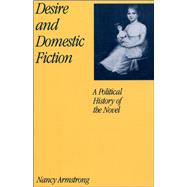
Desire and Domestic Fiction A Political History of the Novel
by Armstrong, Nancy-

This Item Qualifies for Free Shipping!*
*Excludes marketplace orders.
Buy New
Buy Used
Rent Textbook
Rent Digital
How Marketplace Works:
- This item is offered by an independent seller and not shipped from our warehouse
- Item details like edition and cover design may differ from our description; see seller's comments before ordering.
- Sellers much confirm and ship within two business days; otherwise, the order will be cancelled and refunded.
- Marketplace purchases cannot be returned to eCampus.com. Contact the seller directly for inquiries; if no response within two days, contact customer service.
- Additional shipping costs apply to Marketplace purchases. Review shipping costs at checkout.
Summary
Author Biography
Table of Contents
| Introduction: The Politics of Domesticating Culture, Then and Now | p. 3 |
| The Rise of Female Authority in the Novel | p. 28 |
| The Logic of the Social Contract | |
| The Logic of the Sexual Contract | |
| The Sexual Contract as Narrative Paradigm | |
| The Sexual Contract as Narrative Process | |
| The Rise of the Domestic Woman | p. 59 |
| The Book of Class Sexuality | |
| A Country House That is Not a Country House | |
| Labor That is Not Labor | |
| Economy That is Not Money | |
| The Power of Feminization | |
| The Rise of the Novel | p. 96 |
| The Battle of the Books | |
| Strategies of Self-Production: Pamela | |
| The Self Contained: Emma | |
| History in the House of Culture | p. 161 |
| The Rhetoric of Violence: 1819 | |
| The Rhetoric of Disorder: 1832 | |
| The Politics of Domestic Fiction: 1848 | |
| Figures of Desire: The Brontes | |
| Seduction and the Scene of Reading | p. 203 |
| The Woman's Museum: Jane Eyre | |
| Modern Men: Shirley and the Fuegians | |
| Modern Women: Dora and Mrs. Brown | |
| Epilogue | p. 251 |
| Notes | p. 261 |
| Index | p. 291 |
| Table of Contents provided by Syndetics. All Rights Reserved. |
An electronic version of this book is available through VitalSource.
This book is viewable on PC, Mac, iPhone, iPad, iPod Touch, and most smartphones.
By purchasing, you will be able to view this book online, as well as download it, for the chosen number of days.
Digital License
You are licensing a digital product for a set duration. Durations are set forth in the product description, with "Lifetime" typically meaning five (5) years of online access and permanent download to a supported device. All licenses are non-transferable.
More details can be found here.
A downloadable version of this book is available through the eCampus Reader or compatible Adobe readers.
Applications are available on iOS, Android, PC, Mac, and Windows Mobile platforms.
Please view the compatibility matrix prior to purchase.
